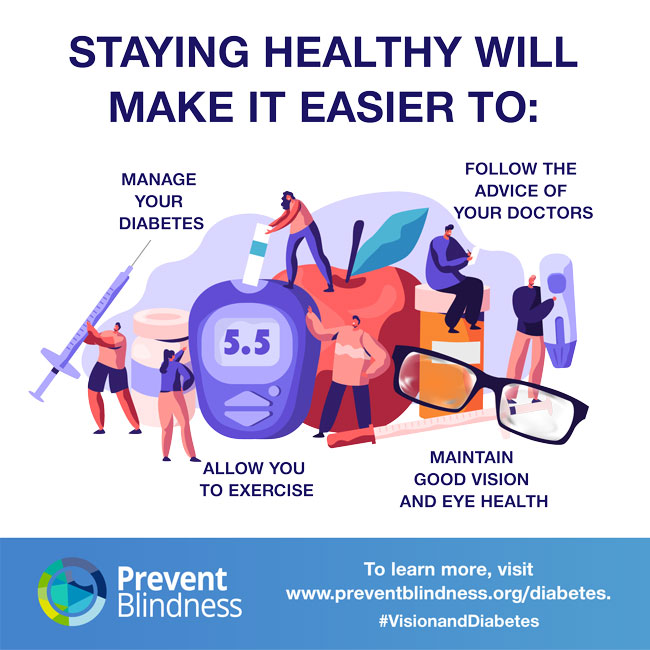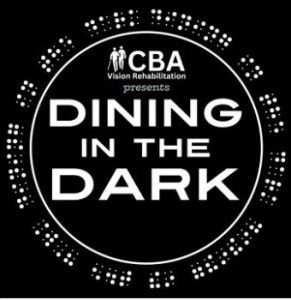
“Diabetic retinopathy is the leading cause of legal blindness in individuals under 65. In the early stages of retinopathy, the vision might not be affected, and you can’t feel it. The only way to detect it early is with a dilated retinal exam. It is recommended to have yearly eye exams. If caught early, there are treatments that may prevent permanent loss of vision,” says John Rundquist, Optometrist and Executive Director of the WNY Center for the Visually Impaired. Dr. Rundquist specializes in low vision eye exams. He holds appointments at the CBA Vision Rehabilitation Services office one day each month.
Anyone with diabetes is at risk for vision loss or blindness from diabetic eye disease. Unfortunately, diabetic eye disease has no warning signs. Early detection, timely treatment, and appropriate follow-up care are the only ways to prevent vision loss. An annual, comprehensive dilated eye examination is one of the best ways to detect early signs of diabetic eye disease. Taking your diabetic medication as prescribed, maintaining a healthy diet, staying physically active, maintaining a healthy weight, and refraining from smoking can also help control your diabetes which lessens your risks of diabetic eye disease.
Ways that diabetic eye disease may affect your eyes:
- Cataract: clouding of the lens of the eye
- Diabetic retinopathy: damage to the blood vessels in the retina
- Glaucoma: increases the fluid pressure inside your eye and leads to optic nerve damage and loss of vision
A cataract is the clouding of the eye’s lens. Many people with diabetes develop cataracts. In the early stages, only your eye doctor may detect a cataract. Over time, cataracts can make your vision blurry, hazy, or less colorful. You may have trouble reading or doing other everyday activities. The good news is that cataract removal surgery is safe and corrects vision problems caused by cataracts.
- You can take steps to protect your eyes and delay cataracts.
- Wear sunglasses and a hat with a brim to block the sun.
- Quit smoking. If you’re ready to quit, call 1-800-QUIT-NOW (1-800-784-8669) for free support.
- Eat healthy. Eat plenty of fruits and vegetables — especially dark, leafy greens like spinach, kale, and collard greens.
- Get a dilated eye exam.
Diabetic retinopathy is the most common diabetic eye disease. By 2030, an estimated 11 million people will have diabetic retinopathy. The longer you have diabetes, the more likely you are to get diabetic retinopathy. Symptoms may not be noticeable but can include blurry vision, halos or flashing lights, double vision, dark spots or floaters, pain or a sensation of pressure, diminished peripheral vision and poor night vision. Only a vision care specialist can diagnose the condition.
The great news is that diabetic retinopathy can be treated to reduce the risk of blindness by 90% when detected early. Laser treatments have been used successfully for decades. More recently medications have been developed which greatly improve treatment options. Controlling blood sugar levels slows the onset and progression of diabetic retinopathy and the need for laser surgery with severe diabetic retinopathy is lessened. As with all conditions, early evaluation and treatment yields the greatest success.
Glaucoma is usually, but not always, accompanied by high internal eye fluid pressure and optic nerve damage that characteristically causes visual field defects in one’s peripheral and central vision. Symptoms include subtle loss of contrast, difficulty driving at night, and in the later stage, loss of peripheral vision and possibly central vision.
Early detection is very important since there are no early symptoms. Risk factors include age, family history, being African or Hispanic American, diabetes, and myopia. To reduce one’s risk, it’s important to have routine eye examinations to detect the disease, faithful use of any prescribed medications and to continue close monitoring by your eye doctor.
It is a good idea to have an annual comprehensive eye examination even if you do not suffer from diabetes and especially if you’ve experienced any visual problems. If you suffer from diabetes, make sure you have a comprehensive eye examination with dilation each year. Make an appointment with our experienced fellowship trained retinal specialist today.
CBA Vision Rehabilitation Services is a NY State Commission for the Blind contracted provider and a United Way agency dedicated to the mission of enabling visually impaired people to be active members of their community and providing education and services to prevent vision loss. CBA serves all of Chautauqua and Cattaraugus Counties. The office at 510 W. Fifth St., Jamestown, N.Y. can be contacted at 716-664-6660 or by visiting www.cbavision.org.






